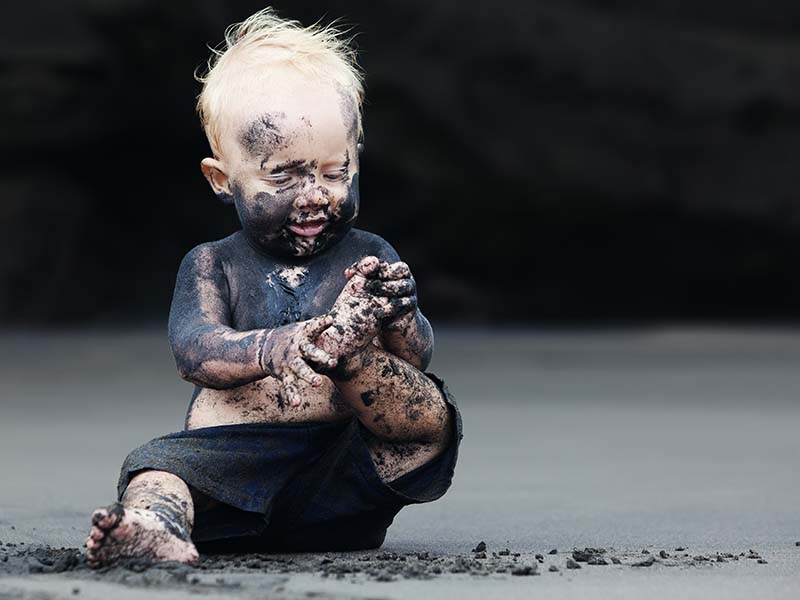How getting dirty can boost your immune system
Asthma, diabetes, allergies, ear infections—what do all of these things have in common?
They’ve all been on the rise in children, despite the fact that in the United States, many of us have state-of-the-art medicine and sanitation methods at our fingertips.
We do everything we think is right to protect our bodies and our immune systems from illness and germs, but some health professionals argue it’s ok to be exposed to a little bit of dirt.
Mary Ruebush, author of “Why is Dirt is Good: 5 Ways to Make Dirt Your Friend,” has five simple rules she came up with as a mother and as a microbiology and immunology teacher:
- Let them eat dirt. She says exposure to dirt helps children build strong immune systems that will provide lifelong protection.
- Use it or lose it. She’s talking about your immune system. Give it the exercise it deserves.
- Don’t encourage superbugs. She recommends trading antibacterial soap for regular soup and antibiotic drugs for nature.
- Keep your vaccinations up to date.
- Consult Mother Nature. Humans were meant to be exposed to the outside world. Go for that first, and save the drugs for when they’re really needed.
Playing dirty
When I was little, my older brother and I would venture down to the creek a half-mile from our house and spend hours playing. We’d build mud houses, make mud pies in our mud kitchen, take mud baths and get as dirty as we possibly could.
The physical act of playing outside and allowing your children to get a little dirty has been linked to fewer allergies and a stronger immune system.
There’s a theory called the hygiene hypothesis, that says the dirtier you get, the less allergies and asthma you’ll have. Basically, the dirtier the better.
David Strachan, who came up with the hypothesis, says allergic disease like hay fever and eczema were less common in children with large families, because they were probably exposed to more germs through their siblings.
He says in countries where good health standards do not exist, the prevalence of allergic diseases remains low, even though people are still chronically infected by pathogens that are no longer present in countries with access to antibiotics.
In some cases, simply being outside seems to have also led to better brain development.
A 2015 study reveals more green space at a children’s school may help develop thinking skills faster.
Researchers tracked nearly 2,600 schoolchildren aged 7-10 from Barcelona for a year, testing them every three months to see how their memory and attention developed. They found that those students exposed to more green space improved their working memory and attentiveness more than those children surrounded by less green space.
Eating dirty
You’ve heard the adage, “You are what you eat.” So if you’re consuming plants that are nourished by sun, water, air and soil, you’re going to get the accompanying nutrients.
Dr. Maya Shetreat-Klein, an integrative pediatric neurologist and author of “The Dirt Cure: Growing Healthy Kids with Food Straight from Soil,” says good old-fashioned dirt provides nutrition, is linked to few allergies, can improve memory and focus, has mood-boosting effects, can reduce inflammation and helps with stress management and sleep.
She and Dr. Josh Axe, author of “Eat Dirt: Why Your Leaky Gut May Be the Root Cause of Your Health Problems and 5 Surprising Steps to Cure It”, aren’t suggesting you eat handfuls of dirt for breakfast.
Rather, they are looking at the concept of “eating dirt” as a broad philosophy, suggesting the consumption of soil-based organisms, which studies show treat a variety of health conditions, including allergies, asthma, irritable bowel syndrome and nutrient deficiencies.
Axe suggests simply rinsing farm-grown vegetables versus scrubbing them, because the surface area of the vegetable contains beneficial microbes.
He also recommends eating probiotic foods like kefir, yogurt and sauerkraut, consuming raw honey and bee pollen to reduce inflammation and protect the liver.
Healing dirty
We’ve all been guilty of it—someone around you has a cold, so you search through the medicine cabinet. You’ve got a headache, so you reach for the Ibuprofen without a second thought.
Shetreat-Klein says in her book many doctors don’t look at the overall picture of the body. They’ll look at specifics: Your asthma is a lung problem; your eczema is a skin problem, etc.
“We must pay attention to all the body’s ongoing symptoms,” she says, adding that medications suppress the symptoms. It’s better to take a step back and look at the overarching problem.
“Medication is not the solution to getting well. Healing the root cause of one’s problem is,” she says.
She recommends exploring the benefits of being outside—even simply walking in nature can serve as a healing mechanism—as well as consuming bitter compounds, such as dark chocolate, leafy greens, chamomile tea and the peels on fruits and vegetables, which stimulate the immune system to help prevent infection in the gastrointestinal tract as well as the ear, nose and throat.
“Somehow, we’ve lost trust in the body’s ability to heal itself,” says Shetreat-Klein. “But each time we mess with our body’s natural survival mechanisms, the body takes a little longer to recover.”







